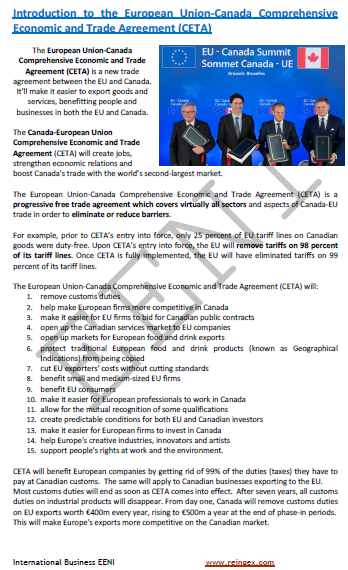European Union-Canada Economic Agreement

EU-Canada Comprehensive Economic and Trade Agreement Customs Duties
- Introduction to the European Union-Canada Comprehensive Economic and Trade Agreement (CETA)
- Key features of the EU-Canada Economic Agreement
- Structure of the CETA Agreement
- Advantages for exporters
- Customs Duties elimination
- Investment Court Systems
- Foreign Trade and investment between the countries of the EU and Canada
- EU-Canada Political Dialogue

The Subject “European Union-Canada Comprehensive Economic and Trade Agreement” belongs to the following Online Programs taught by EENI Global Business School:
Masters: International Business, Foreign Trade.
 Masters adapted to EU Students
Masters adapted to EU Students

Sample - EU-Canada Comprehensive Economic and Trade Agreement:

The EU-Canada Comprehensive Economic and Trade Agreement (CETA):
- Facilitates the product and service Exports
- Eliminates 99% of the customs duties (estimated savings: 400 million Euros per year)
- 92% of the European agri-food products will enter duty-free in the Canadian market
- Eliminate several existing Technical Barriers to Trade
- Open the markets to investments
- Encourages the public procurement
- Reinforces the copyright
A Conformity assessment certificates (toys, electrical equipment...) will be accepted, which will mean significant savings for exporters.

Trade in services liberalization between Canada and the countries of the EU should contribute to the GDP growth (50% for the EU and 45.5% for Canada). This liberalization does not affect the public services.
The EU-Canada Global Economic and Trade Agreement will incorporate a new Investment Court Systems as well as the right of governments to regulate certain sectors (public health, security, consumer protection, etc.) for public purposes.
The European Parliament approved it on February 2017.
Canada and the EU are members of the Western Civilization:
(c) EENI Global Business School (1995-2024)
We do not use cookies
Top of this page








